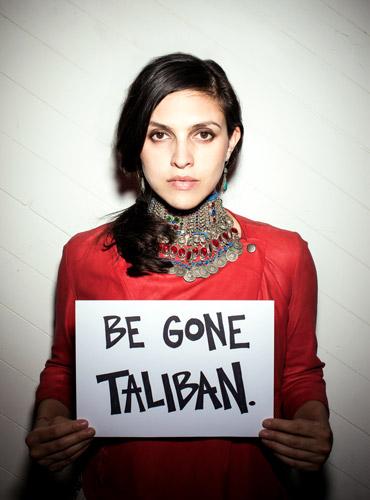 After the Soviet invasion, just days before Ariana Delawari’s birth, her father’s entire family fled Afghanistan. Many of them found refuge at the Delawari home in Los Angeles, where baby Ariana was welcomed by a huge extended family. Her name, Ariana, is the ancient name for Afghanistan.
After the Soviet invasion, just days before Ariana Delawari’s birth, her father’s entire family fled Afghanistan. Many of them found refuge at the Delawari home in Los Angeles, where baby Ariana was welcomed by a huge extended family. Her name, Ariana, is the ancient name for Afghanistan.
“I think those early years really shaped me,” says Delawari. “Our home was a hub of activity, a place where Afghans came together. There was always live music, food [and] festivities. It was a celebration of culture and life, and I was completely immersed in it.”
Meanwhile, her father was immersed in saving Afghanistan. He organized anti-Soviet demonstrations in LA, conducted meetings at the house with mujahideen members and tirelessly lobbied Congress. When the U.S. pulled out in 2002, he was among the first to return to rebuild his country.
At the time, Delawari was in her last semester of film school at the University of Southern California. She began to visit her parents regularly in Kabul—trips she documented in photographs and film.
She was also writing songs and music, and on a visit in 2007, she brought her guitar along. It was a trip that changed everything.
“I felt a shift in the country. People were worried that the Taliban were gaining power, and I had a strong feeling things could get worse. I wanted to collaborate with local musicians and felt it could be my last chance.”
Together with her bandmates Max Guirand and Paloma Udovic, she found herself in her parents’ house in Kabul. Under the protection of two guards armed with AK-47s, she recorded her debut album, Lion of Panjshir—an homage to the Afghan revolutionary Ahmad Shah Massoud. She collaborated with three Afghan ustads, or masters of their instruments: a tabla player, a rabab player, and an 88-year-old dilruba player, the last one to master this instrument.
“These men grew up in a very different Afghanistan, a modern Afghanistan,” says Delawari. “But they had to endure the Soviet invasion, then the civil war, and then the Taliban who banned music. Under Taliban rule, they hid their instruments, often dismantling them and burying them in the ground. It was important to collaborate with them, as they are not only masters of their instruments, but their hearts and souls tell the story of Afghanistan.”
Lion of Panjshir was finished in Los Angeles. It features additional musicians and was mixed by David Lynch, who also produced one of the tracks and released the album on the David Lynch MC record label.
Delawari says one of her favorite tracks on the album is “Be Gone Taliban”:
“You took our land/ claimed to be some God man /
manipulate our faith / but under grace / your plan is weak.”
“I wrote ‘Be Gone Taliban’ after a dream that the Taliban were chasing me. In it, I was flying over the land and had this larger picture of our culture. I wrote the song in first person, but it’s really as if I am Afghanistan and not Ariana.”
The experience of making Lion of Panjshir led her to film We Came Home, a documentary about her travels to Afghanistan, her family’s story and working on the album. The film will be released this year.
“When the album came out, I was very divided emotionally. I was excited about the music and how it was received, but the situation in Afghanistan was getting so much worse. I felt l couldn’t do anything else in my life until I made this film and told the full story. I’m more at peace now knowing that [I] can finally share the story with the world.”
“With each trip I fell deeper and deeper in love with the country,” she says. “This is how I ended up taking my music there and bringing some of the traditional music back with me. I had so much to say about what I was witnessing and experiencing. The film encompasses it all.”
Delawari is also finishing up a new album, which, she says, is very different from the first. “Each album I make will have its own story, its own journey,” she says. “Lion of Panjshir had to be timeless—that was very important to me. The new album does not. It’s very much of this time.” The new album might be a departure, but Afghanistan is never far away. “My heart will always be there. The more I surrender to that, the more I can help the country through my art. I’m not a doctor; I’m an artist. It’s the only way I can help.”
Text by Ellen Georgiou
Photography by Shelby Duncan

